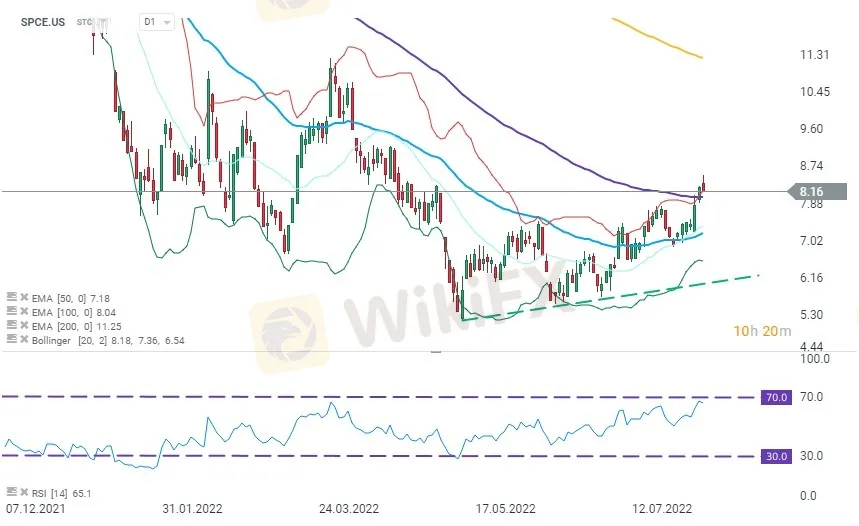WIKIFX REPORT: Virgin Galactic Tumbles After Delaying Commercial Service Again
Zusammenfassung:Virgin Galactic Holdings Inc. shares dropped after the space tourism company again delayed its commercial service, calling for a launch in the second quarter of 2023. The startup had previously disappointed investors by pushing back the launch, once planned for the third, then fourth quarter of 2022. In May, Virgin Galactic delayed it to the first quarter of 2023.
Virgin Galactic Holdings Inc. shares dropped after the space tourism company again delayed its commercial service, calling for a launch in the second quarter of 2023. The startup had previously disappointed investors by pushing back the launch, once planned for the third, then fourth quarter of 2022. In May, Virgin Galactic delayed it to the first quarter of 2023.
Virgin Galactic shares fell 14% in premarket trading Friday to $7.08 as of 7:58 a.m. in New York. The stock dropped about 39% this year through Thursdays close.
Analysts warned in research notes after Virgin reported second quarter earnings Thursday that its cash burn rate is accelerating and it will likely need to raise more cash through equity, which could further weigh on the shares.
The company posted a net loss of $110 million for the quarter and said its cash and cash equivalents totaled $329.9 million, down 40% from a year ago.
EPS: -$0.43 vs -$0.37 forecasts
Revenue: $357k vs $89.8k forecasts
Net loss: $111 million vs. $94 million in Q2 2021
Research and development costs: $62 million vs. $35 million in Q2 2021
Net expenses: $87 million vs. $65 million in Q2 2021
• Virgin Galactic reported a $0.07 higher loss per share than analysts' forecasts. Revenues turned out to be nearly 3 times higher than analysts' assumptions - but still remain small and do not cover the huge expenses the company incurs. The net loss deepened against the Q2 2021 result. The company is incurring increasing expenses due to strategic spending on research and infrastructure development;
• The company postponed the date of its first tourist flight for the third time, which was received very negatively by the market. Previously, management pointed to Q4 2022, then Q1 2023. Subsequent postponements increase the risk due to rising expenses and the company's drag on revenue. However, Virgin Galactic still has nearly $1.1 billion in reserves, which if the company maintains its spending pace - should be enough for several years of strong growth;
• Confidence in the company's management declined despite the formation of a number of strategic partnerships with, among others, aerospace industry leader Boeing (Aurora Flight Sciences) and luxury travel agency Virtuoso. Quotations were not helped by news that construction had begun on a factory in Phoenix, Arizona, which is expected to be operational by the end of next year and will serve as a site for Delta-class ships. Nor did news of the planned delivery of the first Aurora ship by 2025 or the purchase of land in the state of New Mexico, where the 'Future Astronaut Campus', a complex of facilities and hotels owned by Virgin Galactic, is eventually to be located, help;
• Until the company launches into space with its first customers and confirms its ability to earn real profits from its still futuristic business, the valuation of the stock will continue to be weighed down by 'cash burn' and potential problems with scaling the business in an environment of rising capital costs, staff shortages and supply chain problems. Today, the market is clearly pricing in an uncertain future for the company, with the stock losing in the face of declining risk sentiment.
Virgin Galactic (SPCE.US) stock chart, D1 interval. From a technical point of view, the company's shares have been moving in an uptrend since the first half of May. The demand side is currently testing the resistance regions defined by the 100-day exponential moving average (purple curve). The nearest support remains the EMA 50 (blue curve). Stock probalby will open below 7 USD levels.

WikiFX-Broker
Aktuelle Nachrichten
SOL hebt ab! Solana über 137 Dollar – Großanleger pumpen Millionen hinein
Krypto-Rally geht weiter: Bitcoin über 92.000 Dollar – XRP hebt ab
ADA auf Angriff! Cardano hält wichtige Marke – aber geopolitische Risiken bremsen
ETH-Kaufrausch! Mega-Firma schnappt sich fast 33.000 Ethereum – Kurs vor nächstem Sprung?
Ripple: XRP explodiert – was jetzt wirklich hinter dem Kurssprung steckt
Ripple explodiert: Diese XRP-Zahl entscheidet 2026
Morgan Stanley: Diese sechs Faktoren sorgen für steigende Aktienkurse in 2026
Wechselkursberechnung


